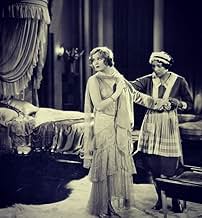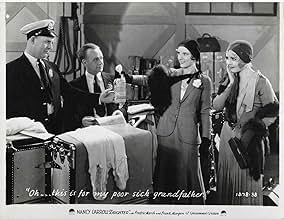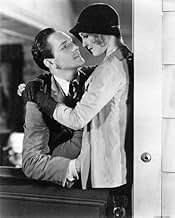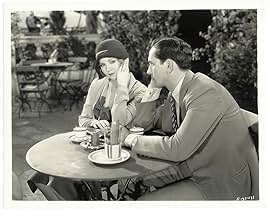A former chorus girl weds a millionaire after the composer she loves leaves. Meanwhile, she strings along an artist in love with her. When the composer returns, she struggles with her needs ... Read allA former chorus girl weds a millionaire after the composer she loves leaves. Meanwhile, she strings along an artist in love with her. When the composer returns, she struggles with her needs for security vs love. High jinks and drama ensue.A former chorus girl weds a millionaire after the composer she loves leaves. Meanwhile, she strings along an artist in love with her. When the composer returns, she struggles with her needs for security vs love. High jinks and drama ensue.
- Nominated for 1 Oscar
- 3 wins & 1 nomination total
Eric Blore
- Party Guest in Angel Costume
- (uncredited)
Charles Halton
- Winslow - Gibson's Secretary
- (uncredited)
Duncan Penwarden
- Mr. Miller
- (uncredited)
Featured reviews
Up until July, 1934, the job of policing the films out of Hollywood was mostly left up to Hollywood. There was no rating system and practically anything might appear in movies. While not extremely common, nudity, adultery, abortion, homosexuality and promiscuity were featured in quite a few pictures...including in Biblical epics such as "Ben Hur" (1925) and "The Sign of the Cross". Often, when folks use the term 'pre-code' they are usually referring to the more extreme films of this era...and "Laughter" clearly is a pre-code plot, as its main theme is adultery.
When the film begins, you learn that Peggy (Nancy Carroll) has married a rich guy (Frank Morgan). But she also has had some admirers--including a suicidal artist and one lover (Frederic March) who stops by for a visit! Now Peggy must decide whether she wants to stay married to the rich man or run off with fun-loving Paul.
Post 1934, such plots clearly would NOT have been allowed until, perhaps, the 1960s. The notion of an old boyfriend showing up and the young wife going off with him to spend a day with him was just too broadminded for the post-code days...and hard to believe that the husband would just sit back and allow this outing to take place. It is, however, reasonably interesting to watch though not the comedy I expected (IMDB called it a comedy romance...but there were very few laughs). Worth your time...especially if you are a pre-code fan but not a fan I'd rush to see either.
When the film begins, you learn that Peggy (Nancy Carroll) has married a rich guy (Frank Morgan). But she also has had some admirers--including a suicidal artist and one lover (Frederic March) who stops by for a visit! Now Peggy must decide whether she wants to stay married to the rich man or run off with fun-loving Paul.
Post 1934, such plots clearly would NOT have been allowed until, perhaps, the 1960s. The notion of an old boyfriend showing up and the young wife going off with him to spend a day with him was just too broadminded for the post-code days...and hard to believe that the husband would just sit back and allow this outing to take place. It is, however, reasonably interesting to watch though not the comedy I expected (IMDB called it a comedy romance...but there were very few laughs). Worth your time...especially if you are a pre-code fan but not a fan I'd rush to see either.
... or make a wise decision concerning your future for that matter. The life of ex-chorus girl Peggy (Nancy Carroll) now socialite wife to public utilities king C. Morton Gibson (Frank Morgan) seems to be an object lesson in this fact. Peggy is already a millionaire's wife by the time the film opens, so we don't see any of her past life, just the human remnants of it. First there's Ralph, an overwrought starving artist who is obsessed with memories of Peggy but whom Peggy never apparently loved. Next there's Paul Lockridge (Fredric March), starving musician, whom Peggy did love but was overseas at the time she made the decision to marry Gibson, and thus could not plead his case.
Peggy doesn't have to worry about being hungry anymore, in fact she doesn't have to worry about anything in her new life. However, her husband treats her like a cross between a bird in a gilded cage and a welfare case, always talking about her "unfortunate past" and scrutinizing her every unexplained absence. Neither is he a particularly passionate fellow - accumulating more and more cash is his real passion. The lack of joy in Peggy's life comes to the surface when Paul returns from Europe to win her back. His only asset - laughter, the joy of life lived experience by experience. Add to this a chance meeting of Peggy's unstable old suitor, Ralph, with Peggy's new stepdaughter, Marjorie, that turns romantic and complications abound.
This is a rather understated film, nothing is particularly laugh-out-loud funny or horribly suspenseful and melodramatic save for a couple of short scenes in each case. Thus the film's success largely rests on the acting of the performers, which is quite good. Since this film was made in 1930, many might think it is about the desperate decisions and trade-offs people had to make to keep eating during those times, but it really predates the depression.
This is a good one for fans of Nancy Carroll, who plays her understated role very well - that of a decent woman whose profession of chorus girl guarantees not only that she has just a few good years to make a decision on the only profession that could come afterwards for such women in the 1920's - marrying well, but that everyone automatically doubts her character because of her profession.
Peggy doesn't have to worry about being hungry anymore, in fact she doesn't have to worry about anything in her new life. However, her husband treats her like a cross between a bird in a gilded cage and a welfare case, always talking about her "unfortunate past" and scrutinizing her every unexplained absence. Neither is he a particularly passionate fellow - accumulating more and more cash is his real passion. The lack of joy in Peggy's life comes to the surface when Paul returns from Europe to win her back. His only asset - laughter, the joy of life lived experience by experience. Add to this a chance meeting of Peggy's unstable old suitor, Ralph, with Peggy's new stepdaughter, Marjorie, that turns romantic and complications abound.
This is a rather understated film, nothing is particularly laugh-out-loud funny or horribly suspenseful and melodramatic save for a couple of short scenes in each case. Thus the film's success largely rests on the acting of the performers, which is quite good. Since this film was made in 1930, many might think it is about the desperate decisions and trade-offs people had to make to keep eating during those times, but it really predates the depression.
This is a good one for fans of Nancy Carroll, who plays her understated role very well - that of a decent woman whose profession of chorus girl guarantees not only that she has just a few good years to make a decision on the only profession that could come afterwards for such women in the 1920's - marrying well, but that everyone automatically doubts her character because of her profession.
Harry D'Abbadie D'Arrast always complained that this movie, which he considered his best, was undeservedly forgotten, for it created many concepts which would reappear in comedies of later years.
This time he was right. It is surprising to find in such an early film the conflict between economical safeness and spiritual freedom that would later be typical of such wonderful films as Frank Capra's You Can't Take It with You, and very especially, George Cukor's Holiday (not a surprising coincidence, since it was written by the same screenwriter as Laughter).
It is an answer to the existentialism dilemma, where the only choices to make are living for the future (marrying a millionaire) or for the present (enjoying the moment you're currently living). Laughter goes even further than the later films, for it incorporates a third answer: suicide, which takes the story for the path of melodrama with a surprising respect of its unity.
In fact, what is most curious about Laughter is that it is much more mature that one would suspect. The structure of the story, the performances and even the humor feels fresher than those of other comedies of the period. A good example is the surprising scene in which Fredric March and Nancy Carroll do some role playing just for the sake of it: they pretend to be a marriage in which he is the woman and she is the man. They both imitate the conventions of each sex's supposedly proper behavior, making fun of predetermined attitudes and social obligations, clearly defending sponaneity and freedom as opposed to that which they parody/criticize (social roles conditioned by sexes).
Also the way the structure of the story is inventive enough, with a past time we never see but which is reflected in the present, and a triggering opening which serves as the conclusion of the movie as well. In fact, many other the elements of the movie (starting by the title itself) are developed in more than one level, like this one.
The biggest fault of the film is not in its final quarter (which, contrary to what I had read, seems to me fluid and coherent with the rest of the film): it is a number of technical limitations, which harm its rhythm for today's audience. These were common in the beginning of sound film (Lubitsch somehow avoided most of them in The Love Parade, made one year before this and quite a miracle).
The shortcoming I found most annoying was the impossibility for the camera to show the characters in a more frontal angle than the profiles during dialogs, which gives some important scenes a very old fashioned stagy feel.
(It had to do with the sound equipment: for what I know, they couldn't edit the sound they recorded, so they had to film each scene with several cameras so that they could use full takes of sound. So there could only be one light setup, and therefore, the characters had to be filmed from the only side where the light was better).
However, compared with most movies of that period, Laughter is a clear winner, and it is no wonder that March considered it one of his best films. His performance is relaxed, joyful and attractive still today, and so is Nancy Carroll's.
It is a pity that D'Arrast is not better known today, nor this movie properly restored/distributed. It is a interesting work on many levels, by a highly original and innovative filmmaker.
This time he was right. It is surprising to find in such an early film the conflict between economical safeness and spiritual freedom that would later be typical of such wonderful films as Frank Capra's You Can't Take It with You, and very especially, George Cukor's Holiday (not a surprising coincidence, since it was written by the same screenwriter as Laughter).
It is an answer to the existentialism dilemma, where the only choices to make are living for the future (marrying a millionaire) or for the present (enjoying the moment you're currently living). Laughter goes even further than the later films, for it incorporates a third answer: suicide, which takes the story for the path of melodrama with a surprising respect of its unity.
In fact, what is most curious about Laughter is that it is much more mature that one would suspect. The structure of the story, the performances and even the humor feels fresher than those of other comedies of the period. A good example is the surprising scene in which Fredric March and Nancy Carroll do some role playing just for the sake of it: they pretend to be a marriage in which he is the woman and she is the man. They both imitate the conventions of each sex's supposedly proper behavior, making fun of predetermined attitudes and social obligations, clearly defending sponaneity and freedom as opposed to that which they parody/criticize (social roles conditioned by sexes).
Also the way the structure of the story is inventive enough, with a past time we never see but which is reflected in the present, and a triggering opening which serves as the conclusion of the movie as well. In fact, many other the elements of the movie (starting by the title itself) are developed in more than one level, like this one.
The biggest fault of the film is not in its final quarter (which, contrary to what I had read, seems to me fluid and coherent with the rest of the film): it is a number of technical limitations, which harm its rhythm for today's audience. These were common in the beginning of sound film (Lubitsch somehow avoided most of them in The Love Parade, made one year before this and quite a miracle).
The shortcoming I found most annoying was the impossibility for the camera to show the characters in a more frontal angle than the profiles during dialogs, which gives some important scenes a very old fashioned stagy feel.
(It had to do with the sound equipment: for what I know, they couldn't edit the sound they recorded, so they had to film each scene with several cameras so that they could use full takes of sound. So there could only be one light setup, and therefore, the characters had to be filmed from the only side where the light was better).
However, compared with most movies of that period, Laughter is a clear winner, and it is no wonder that March considered it one of his best films. His performance is relaxed, joyful and attractive still today, and so is Nancy Carroll's.
It is a pity that D'Arrast is not better known today, nor this movie properly restored/distributed. It is a interesting work on many levels, by a highly original and innovative filmmaker.
Harry D'Abbadie d'Arrast doesn't hang about with this tale of rags to riches that has loads of emotional baggage thrown in for good measure. "Peggy" (Nancy Carroll) is let down by her true love and takes the easy option by marrying the dull and staid millionaire "Gibson" (Frank Morgan) who guarantees her an easy, if uninteresting life. She's too restless a spirit for all of that, and although she resists the advances of the boyish and unstable sculptor "Ralph" (Glenn Anders) she is ready to jump ship when the carefree "Lockridge" (Fredric March) re-emerges into her life with a plan for her to escape her silk-clad drudgery and head for la Vie Parisienne - via some high jinx and a bit of burglary. Tempted, her life is thrown into turmoil by the daughter of her husband, "Marjorie" (Diane Ellis) who has a few designs of her own! This tries hard to straddle a few genres here, and whilst the dramatic aspects work well enough, the comedic ones prove a little beyond everyone to convincingly pull off. As the story progresses, even the usually reliable Morgan looks a little uncomfortable with the increasingly contrived nature of the plot within a plot within a plot. Also, by the end I'd rather concluded that "Peggy" was no great shakes as an human being either. The production could fairly be described as embryonic and the photography seemed framed at times as if to allow the actors to read cue cards off-set the cameras - that looked a bit squinty. Still, it's all quite light-hearted and enjoyably enough paced to pass ninety minutes effortlessly.
I was expecting this movie to be much more than it was. I read that it was one of Fredric March's personal favorites, his others being A Star is Born, Death Takes a Holiday, and Best Years of Our Lives, and so since he liked it I thought it was going to be really good. I must say I was really bored with it. The story seemed boring and not really well written. I think it could have been a much better story if the script was better. As is, there were too many loose ends. Sure, there were some funny moments (it was enjoyable to see Fred draped in a white bearskin rug!), and Fred gave a few kisses, and you got to see him in his undershirt. But I have seen him in MUCH better roles, more romantic, more funny...everyone's opinion is different. This is mine...It is one of the few Fred movies I didn't really like.
Did you know
- TriviaOrson Welles cast scene-stealing character-actor Glenn Anders in The Lady From Shanghai because he had remembered how good he was in this film.
- ConnectionsAlternate-language version of A Mulher Que Ri (1931)
- SoundtracksLittle Did I Know
by Irving Kahal, Pierre Norman and Sammy Fain
Details
- Runtime
- 1h 25m(85 min)
- Color
- Aspect ratio
- 1.20 : 1
Contribute to this page
Suggest an edit or add missing content
































